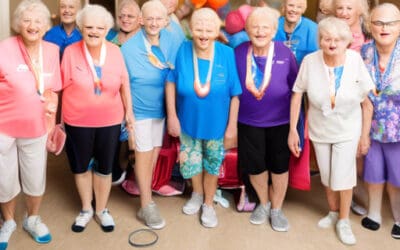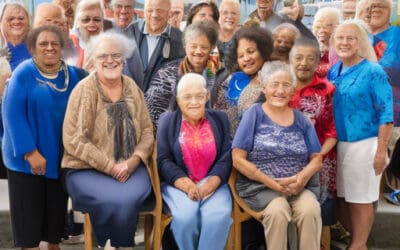Respite Care Psychological Benefits
Elderly respite care is essential for caregivers who need a break from caring for a chronically ill or disabled loved one. Beyond rest, short term respite care for elderly has psychological benefits for caregivers and those they care for. Understanding these benefits helps families decide whether to use respite care.

Respite care prevents caregiver burnout by providing support. Stress from caregiver duties can drain caregivers physically and emotionally. Constant caregiving can cause loneliness, despair, and resentment. Respite care gives caregivers a break to recharge. Breaks can boost emotional health, making caregivers more effective and empathetic.
Older people improve their attitude and outlook during respite by changing their surroundings and meeting new caregivers and peers. These encounters can reduce loneliness and social isolation in older adults, especially those with mobility or cognitive issues. Even brief social interaction boosts mental activity and mood.
Older adults typically need independence and variety daily, but respite care gives both. Self-esteem and dignity may increase. Elderly people usually feel better when they perceive they are not a ‘burden’ to their primary caretakers.
Respite care facilities offer personalized activities for seniors, which can boost their mood. These activities keep kids engaged and match their strengths and interests, which can improve their cognitive and physical health. Engaging in activities they enjoy but may not have at home can rejuvenate them and improve their life satisfaction.
Knowing their loved ones are in safe, skilled care helps caregivers mentally. With this peace of mind, they can pause without guilt or concern. They can use their free time to care for themselves, whether medical appointments, social events, or much-needed isolation. Self-care is essential for mental health and can improve family relationships by reducing caregiving stress.
Respite care is flexible enough to be employed before a caregiver becomes overwhelmed. Regular breaks help caregivers maintain emotional balance and reduce stress. This proactive approach to caregiving can help caregivers avoid stress and burnout and maintain their mental health.
The transient nature of respite care creates a unique caregiver-elder interaction. Both parties may be grateful for the caregiver’s return, and older people may anticipate their caregiver’s return, enhancing ties and gratitude. This new interpersonal dynamic can strengthen bonds and emotional resilience.
Respite care’s practical and psychological benefits are interwoven. Relief from physical caring obligations indirectly improves emotional and psychological well-being for all parties. Families should view respite care as a vital part of their caring approach. By providing a comprehensive range of care, respite care can help caregivers and their loved ones develop emotionally and psychologically.

Respite care training for caregivers improves skills and knowledge.
Senior respite care demands particular knowledge and abilities to meet their complicated needs. Respite caregiver training programs have been created to meet this demand. Caregiver training is essential to providing high-quality physical and emotional care for older people.
Respite caregiver training covers many important issues. It usually covers senior care basics like mobility and medication management. It also covers more specialist topics like managing age-related illnesses like dementia and Alzheimer’s, which require patience and skill.
These training programs emphasize geriatric psychological and emotional requirements. Caregiver training helps them spot mental health disorders like depression and anxiety, which are more common in seniors. Caregivers need this training to provide physical, emotional, and psychological support to older people, improving their quality of life.
Additionally, respite care training programs emphasize interpersonal skills. Caring for seniors with hearing or cognitive impairments requires good communication. Caregivers learn to communicate clearly to understand and address senior requirements. These programs also teach conflict resolution, which is helpful when handling the demanding behaviors of older adults with mental health or cognitive challenges.
Emergency response training is essential to these programs. Caregivers learn to handle medical situations like falls and sudden illnesses. This training helps caregivers respond quickly and effectively until medical professionals arrive. It boosts the caregiver’s confidence and gives families who commit their loved ones to respite care peace of mind.
Ethics and sensitivity training are also taught. Caregivers are stressed about the dignity and respect of older people. Caregiving is sensitive; thus, personal boundaries and elderly privacy must always be respected. Ethical training helps caregivers follow the highest standards, keeping seniors safe and respected.
Many programs include hands-on experience in addition to formal training. Under supervision, students can apply their expertise to real-world caregiving tasks. This practical application is essential for improving caregiving abilities and bridges theoretical knowledge and experience.
Advanced training modules may also cover the latest aged care technologies and tools. Learn how to use medical alert systems, mobility aids, and other equipment to improve caregiving for caregivers and older people. By staying current on technology, caregivers can provide the best care.
Continuing education is another hallmark of respite care training. As medical knowledge and technology advance, caregivers receive continual training on best practices and new elderly care technology. Several programs offer annual refresher courses or seminars on developing issues to ensure caregivers provide excellent care.
Comprehensive training programs help respite caregivers tackle the problems and responsibilities of aged care. These programs improve care for older people and make caregiving more fulfilling and successful. Proper training helps caregivers understand elders’ particular requirements and the intricacies of their care, improving outcomes for everybody.
Maintaining a high standard of care and adjusting to the changing elder care scenario requires ongoing education and training. In addition to practical skills and emergency responses, respite care training emphasizes caregiver self-care. They learn stress management and burnout prevention for long-term caring success. This holistic approach guarantees that caregivers are technically adept, emotionally resilient, and can continue their crucial tasks without personal sacrifice.

Training programs generally cover healthcare system complications and caregiver legal rights and duties. Advocating for older people and ensuring their rights and needs are honored in care settings requires this understanding. Caregivers also learn about community resources like support groups, which can help them and older people.
These extensive training programs help the community, caregivers, and patients. Well-trained caregivers raise community awareness of aging needs and provide more families with informed, empathetic care.
Many municipalities offer these training programs through health departments, community colleges, or commercial healthcare firms. They may be provided in person or online, giving caregivers who are already multitasking more freedom. These programs verify caregiver abilities and establish trust with respite care families.
Respite care training programs prepare caregivers to offer high-quality, compassionate care for older people. Society gives older people the attention and respect they deserve by investing in thorough training. This creates a community where young and old can thrive, backed by the efforts of skilled experts who consider caring a service to humanity.



